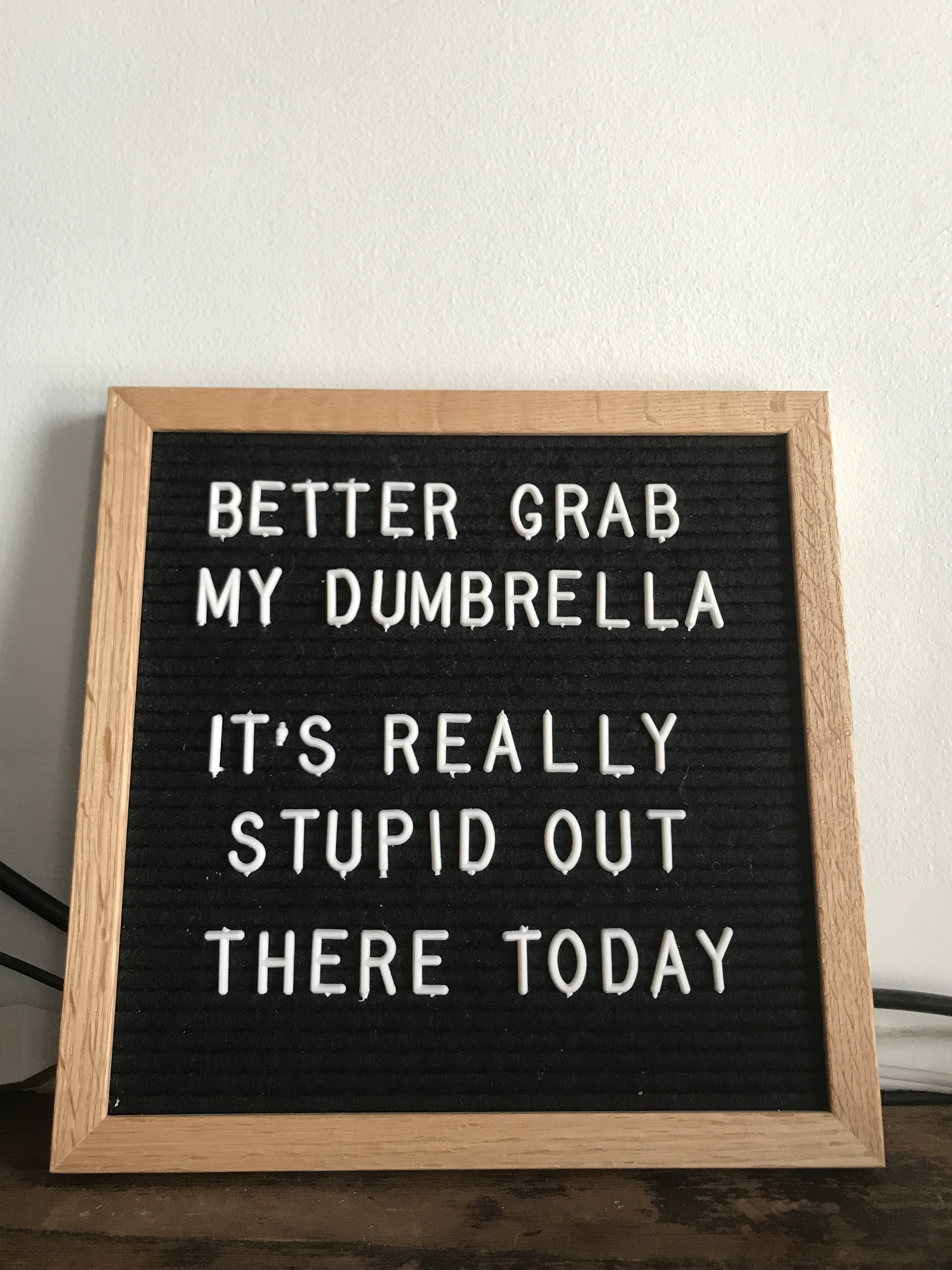If something about your mood or disposition feels “off”, it’s not about the food.
If you’ve never had any issue eating all food groups, but suddenly have an insatiable desire to change something—anything—it’s not about the food.
If you’re running, or training, or life, isn’t going well, it’s not about the food. (Unless you’re not eating enough energy for your body to maintain health.)
If you’re wondering about that one time when—nope, stop. It’s not about the food.
I know there’s a lot going on, and it’s hard to grapple with the flood of emotions you may be feeling, or the struggle you may be fighting, but please remember, It’s Not About The Food.

One physical tool I wish I could give all of you: a Dumbrella, for protection from diet culture on days you’d rather not be soaked with it.
Disclaimer: You know your body best. If there is any indication to you that food may be causing some issues, seek help from an expert. This post is not intended to diagnose, or make light of, any serious health issues (including digestive disorders, food allergies, and medical conditions that require nutrition management), nor is it meant to replace individualized care from a certified and licensed healthcare professional. (Certified and licensed, repeat.)
First, let me give you a tool:
Good for you, not for me.
It’s a mantra that may work wonders as you navigate the currents of comparison traps and triggering food-based messages on social media. It’s a mantra that may help you detach from the conversation, especially if it’s one you don’t feel strong enough to wrestle with right now.
It’s okay to not feel strong enough. We have all been there. It’s okay to still be there.
The trigger-wave can come up strong, and sometimes unexpectedly, as you scroll, or listen, or even feel like you’re talking in a seemingly safe space. Ride the wave with caution, but don’t convince yourself you have to change the tide in that moment. Or that day, or the next day.
If you’re struggling, the answer is probably not to cut out “common allergens” for weeks at a time.
The answer may be to take a step back and see what is at the root of your feelings. It may also be to give yourself permission to feel those feelings, instead of trying to cure them with an outside action. And permission to seek help, from experts who specialize in all of the above.
The answer is definitely not “cut out” foods, and post about it on social media. But if that’s the course someone has taken, it’s okay to say (to yourself, or to them): Good for you; but not for me.
I (Heather) am writing this post to you because I’ve been stable in my recovery for years, and can speak from a dietitian’s perspective without compromising my self-care. I responded to a recent post by an elite athlete about drastically cutting out foods, because I know the harm those posts do, especially to you, and I can’t not say something. But if you don’t feel strong enough to do that, please refrain from reading comments, and posts, about things that start to feel triggering to you.
And please don’t assume responsibility to redirect the course of every diet-focused, triggering conversation (or the opinion of each person involved). You don’t have to take that on. Those of us who know your struggles and the work you’re doing are here to change tide, so you can focus on navigating the waters.
It’s not about the food.
I know this is true approximately 98 percent of the time, because I’ve been there, and I work with people who are still there. As a dietitian in private practice, I hardly talk about food. Because when we open the space to really explore and dig into what someone is experiencing, two things happen:
1) They realize they know more about food, and their body, than they were giving themselves credit for. No eliminations needed.
And 2) It’s not about the food.
If you need support, please don’t hesitate to reach out. If you need community in this fight, join ours. If you need to stop following athletes and individuals who post things that are harmful to you, here’s permission to do so (if you feel like you need it).
Let's Go!
Coaching for Runners
Work with our coaches for a personalized training plan that takes into account every aspect of your life - from season to traveling to terrain.
Learn More
Workshops for Teams
Book a workshop to help shift team cultures and coach attitudes to provide a healthier environment and more competitive athletes.
